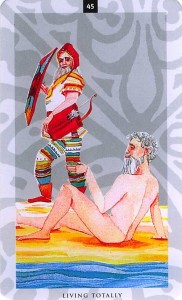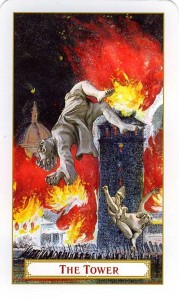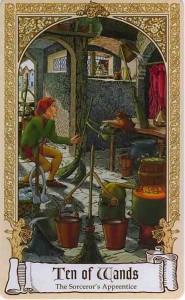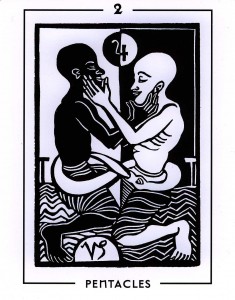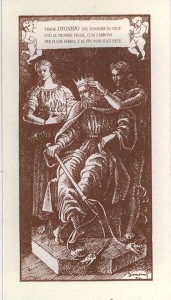 Artist: Maurizio Bonora
Artist: Maurizio Bonora
Author: Matteo Maria Boiardo
The Matteo Maria Boiardo Tarocchi deck is based on a poem about tarot cards by Count Matteo Maria Boiardo, written sometime between 1460 & 1494. He used the structure: 4(suits) x 14(cards per suit) + 22(trumps) = 78 cards. As his poem is one of the oldest references to a deck with this exact structure, it is possible that Count Boiardo invented this now-prevalent structure.
This card refers to King Dionysius I or Dionysius the Elder (ca. 432–367 BC), a Greek tyrant of Syracuse, in what is now Sicily, southern Italy. He conquered several cities in Sicily and southern Italy, opposed Carthage’s influence in Sicily and made Syracuse the most powerful of the Western Greek colonies. He was regarded by the ancients as an example of the worst kind of despot— cruel, suspicious and vindictive. Dante places King Dionysius I in a river of boiling blood in the Inferno of his Divine Comedy.
This card reads—
TIMOR DYONISIO del tonsore in vece
usò le proprie figlie, cum carboni
per fugir ferro; e al fin non fugí nege.
Which can be loosely translated as—
FEAR Instead of using a barber, DYONISIUS
had his own daughters shave him with coals to avoid iron;
in the end he avoided nothing.
[Translated with major help from http://trionfi.com, an excellent site about tarot history with plenty of pictures.]
Cruel king Dyonisius’ paranoid suspicion lead him to regard all his subjects as potentially threatening. For this reason he forbid knives, razors and other such sharp iron tools into his chamber. Instead of using a barber, he trained his daughters— whose bodies did not go unsearched before entering his presence— to trim his beard hairs with coals of burning nutshells.
Thomas Preston (1537-1598) mentions this event in his play Cambyses (1569)—
The king himself…
…trusteth none to come near him,
Not his own daughters will he have
Unsearched to enter his chamber, which he hath made barbers his beard to shave,
Not with knife or razor, for all edge-tools he fears,
But with hot burning nutshells they singe off his hairs.
Richard Edwardes (1525-1566) mentions it his tragicomic play Damon and Pythias (1564)—
[The collier asks Wyll and Jack:]
Has the Kinge made those fayre Damsels his daughters,
To be come now fine and trimme Barbers?
[Jack replies:]
The king him selfe…
…trusteth none, to come nere him: not his wone doughters wil he have
Unsercht to enter his chamber, which he hath made barbars his beard to shave:
Not with Knife or Rasour, for all edge tooles he fears,
But with hote burning Nutshales, they senge of his heares.
Count Boiardo’s poem predates both of these plays.
In the end, Dyonisius the Elder did not escape death. None do, as death is heaven’s only guarantee that comes with birth. The king was possibly poisoned by his physicians at the instigation of his son, who succeeded him as ruler of Syracuse. Or perhaps he celebrated so fiercely that he drank himself to death. Others report that he died of natural causes. Another theory suggests vengeful murder by compatriots who were bitter about the king’s earlier purges and taxation imposed upon them.
The tyrant king spreads fear among his subjects, his enemies, and throughout his court. Thus surrounded by fear, he becomes paranoid of those subjected to his treacherous rule. The tyrant king— the King of Fear.
[The immense amount of research required to write this post has given me a great deal of satisfaction.]




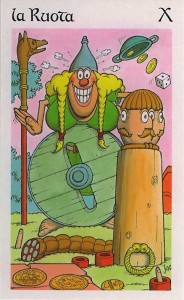
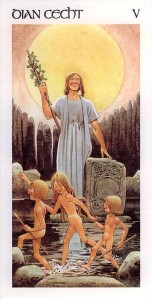

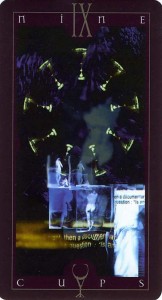
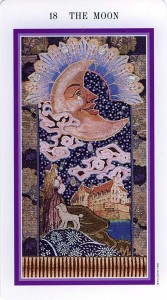
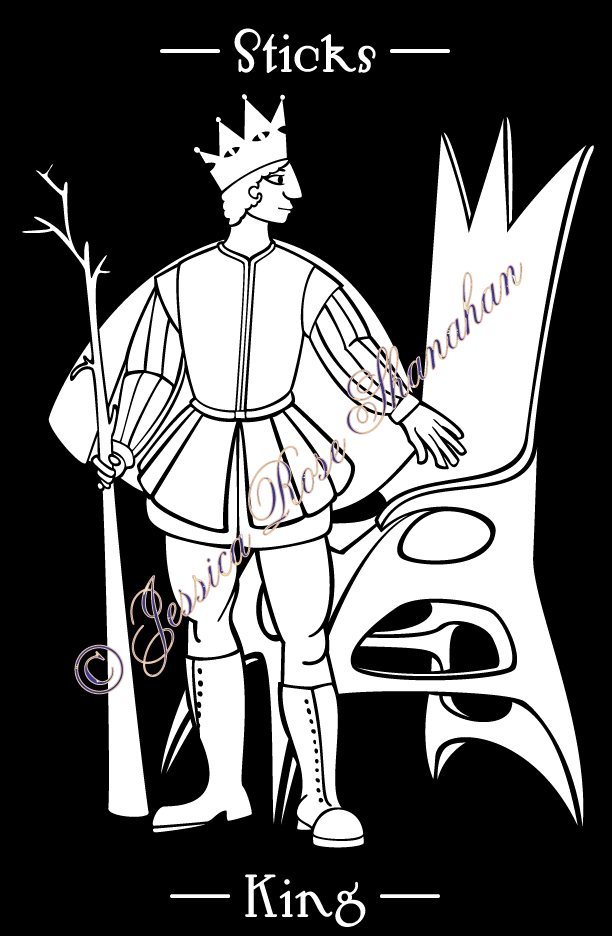 Artist: Jessica Rose Shanahan
Artist: Jessica Rose Shanahan